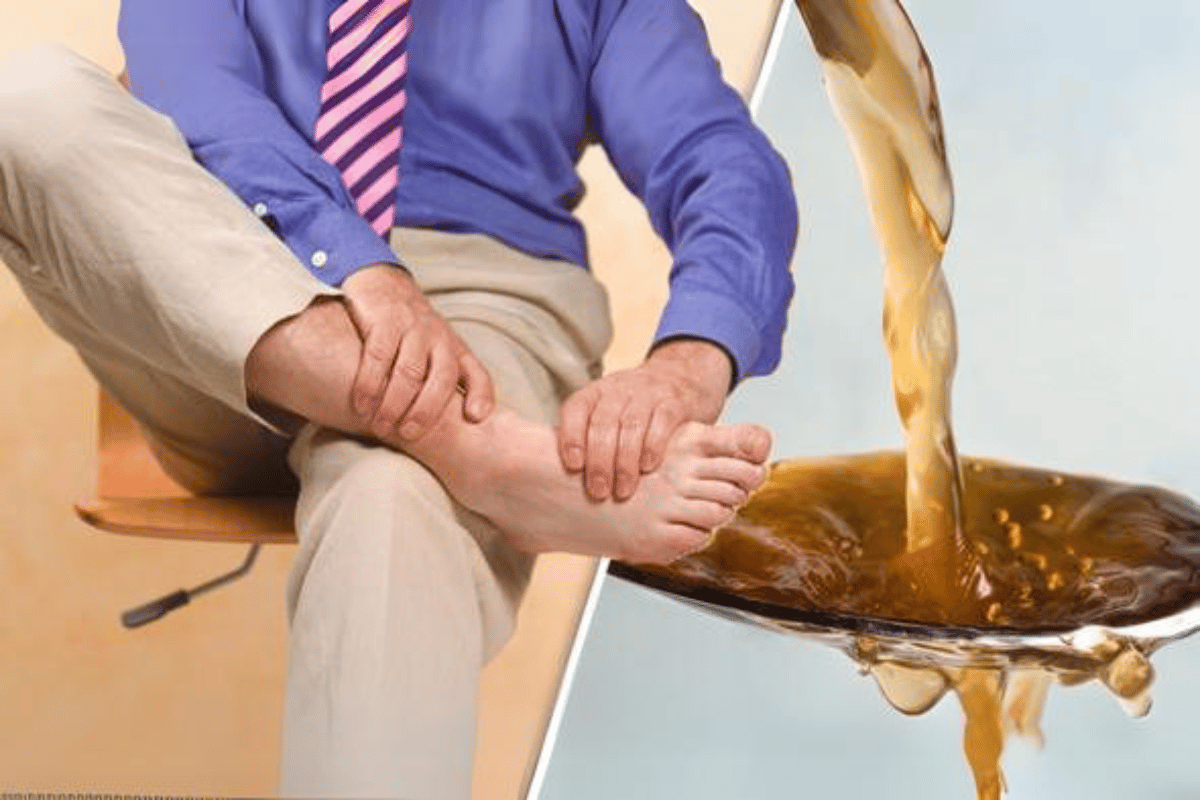In the quest to lose weight, some have turned to using apple cider vinegar topically on their feet overnight In recent years there’s been a surge of people using apple cider vinegar (ACV) for weight loss. ACV has built-up and honed its reputation as a modern miracle ingredient for weight loss. It came about by associating ACV with what has long been regarded as the most effective remedy for successful and sustainable weight-loss regimens – lifestyle changes and diet change. But using ACV topically on your feet at night is one such effort.
It’s an experiment in weight loss and insomnia, all under the premise that altering the microbiome can impact sleep and systemic metabolic health. Theoretically, topical use of ACV should activate change by way of the skin, from there affecting systemic processes that govern weight regulation. In 2024, 12 people struggling with insomnia used this method to test its efficacy.
What’s more, the connection between getting enough sleep and weight loss is well-documented, so by helping people sleep better, we could also help them lose weight, too. This article describes how overnight ACV drinking can provide both, at least for the insomniacs who tried it.

Understanding the Role of Apple Cider Vinegar in Weight Loss
Apple cider vinegar (ACV) is celebrated for its many health benefits, and it is particularly popular for weight loss. One of its main active constituents is the acetic acid which, if studies are to be believed, has the ability to reduce the formation of fat tissue, to increase the burning of fat and to limit the appetite, making it a strong candidate for a weight-loss diet.
The topical application of ACV, presumably in the foot bath overnight, also harnesses the skin’s hyperpolarisation effect. The skin typically acts as a passive diffusion barrier to a host of substances, but some metabolites like acetic acid may be able to diffuse through this barrier, particularly in less barrier-competent regions such as the soles of the feet. This could lead to a slow and steady absorption of the healing acids of ACV throughout the night, timed to the body’s circadian rhythms that dictates when to metabolise and when to restore.
Dermatology and holistic medicine professionals alike note that applying ACV in this way might enhance its systemic benefits without causing the gastrointestinal distress that oral ingestion can trigger. By avoiding the digestive tract, ACV applied topically could enhance its ability to impact metabolic processes, such as lipid oxidation and energy expenditure.
The overnight application also fits in perfectly with what chronobiologists, researchers in the science of natural physiological rhythms, know about our metabolic rate changing at night. These metabolic processes might be facilitated by what ACV is doing for the liver at night, improving the effects of ACV on fat metabolism and overall energy regulation.
Stories of 12 Insomniacs
The story of weight loss via the unconventional route includes the experiences of 12 insomniacs whose night-time apple-cider vinegar experiment sheds light on the applesauce arena of a weight-loss diet – sleep quality, a domain of health on which so much in metabolic balance hangs.
All were sceptical at first but eager to find a non-invasive way to enhance both sleep and weight control. They soaked their feet in a solution of apple cider vinegar and baking soda nightly based on the idea that the formulation was easy and offered potential for dual benefits.
Mark, 45, a software developer, lost a little less than 4 pounds over the first month, but in fact noticed more immediate effects. ‘The most dramatic change was just how fast I fell asleep and the quality of that sleep,’ he said. Better sleep quality can help with weight maintenance indirectly, by regulating hormones that control hunger and satiety.
Jenna, 35, a nurse, reported that her nighttime anxiety and snacking are much less frequent since she began foot soaking. She’s also lost 6lbs in two months, according to her own estimates. ‘It’s not about the pounds,’ she said. ‘It’s how I feel overall, and it has really helped me regulate my habits at night.’
While the experiences vary from person to person, and the results don’t always include weight loss, the reports tend to be similar: a more general sense of wellbeing. The majority of participants reported that they were sleeping better, feeling less stressed, and experiencing less anxiety – all key health parameters.

Analysis of Results and Health Implications
The 12 subjects’ night-long trials of soaking their feet in apple cider vinegar can be looked at together here to give an overall picture of how likely this self-help method for weight loss and better sleep is to work, and whether it is at all unsafe.
The data illustrates that the results varied, with some participants who lost 20-100lbs and had improved sleep quality while some who had moderate benefits. In average, participants lose 2-5 lbs after 3 month period. However, what mattered more is almost all participants had improvement in sleep quality, which is crucial for any one’s health and well being.
These findings raise concerns for health professionals, who say that apple cider vinegar can likely be used topically without much risk, but that the long-term use has not been studied. And because everyone’s skin is different, dermatologists will tell you that any treatment could potentially irritate or sensitise the skin. The key is to monitor your skin for irritation as you try this method, and to stop using it if your skin becomes red or inflamed.
Nutritionists point out that the weight loss is most likely the result of several factors – including improved metabolism resulting from better sleep patterns – as well as a placebo effect: the subjects change their lifestyles in anticipation of results and lose weight anyway.
So far, health care professionals all agree that despite the foot soak’s encouraging results, it is not a replacement for the standard practices of weight loss and health care. It is just a complimentary element of one’s overarching health strategy, which should involve diet and lifestyle changes, such as exercise, along with regular medical advice.

Conclusion
And their adventures in foot-soaking with apple cider vinegar will end where it all begins: with a nuanced acknowledgement that the method of foot bathing for weight loss is: I don’t know. It doesn’t seem to work for everyone. But it definitely seems to enhance sleep. Furthermore, the quality of your sleep greatly affects the health of your heart.
In the study, health professionals recommend the technique as part of an overall health and wellness approach when used as a complementary modality, with cautious execution, careful attention to physical reactions to the practice (such as skin sensitivity) and consultation with healthcare providers for consideration of contraindications for use with one’s specific needs and overall health.
To conclude: the apple cider vinegar foot soak may be an interesting cross-section of folk home remedies and modern wellness trends. It’s a promising solution for individuals hoping to promote restful sleep and support weight management in a gentle, low-invasive way. Ultimately, health interventions are most useful for everyone when we learn to personalise and moderate our wellness practices, such that any new addition to our toolkit is, fundamentally, a blessing.
apple cider vinegar on feet overnight for weight loss
Frequently Asked Questions (FAQ)
1. What are the main benefits of soaking feet in apple cider vinegar overnight?
Benefits one can derive from soaking feet with apple cider vinegar overnight, include dropping weight, getting better sleep and feeling better. People claim that after this treatment they feel more rested, lighter, less bloated and less tense – which also contributes to weight reduction.
2. How does apple cider vinegar help to lose weight when it is put on feet overnight?
Apple cider vinegar contains the active compound acetic acid, which can enhance metabolism as well as reduce the retention of water if it gets through the skin, which it might, since you’re wearing it all night.
3. Can everyone use the apple cider vinegar foot soak method?
This approach is not for everyone, perhaps particularly those with sensitive skin who need to check with a practitioner before using for the first time, but it can prove beneficial for a great many. Be sure, however, to test it for skin reactions and irritation the first few times.
4. How often must I soak my feet in apple cider vinegar each day to make it most effective?
Study participants generally soaked their feet three to four times a week (you can go more or less often, depending on your tolerance, and a professional can help you figure out what’s best for your needs). Consistency and moderation are the right combination of factors to see benefits without causing irritation to the skin.
5. Are the weight loss and sleep improvements from this method scientifically proven?
Users report that they lose weight and get a better night’s sleep, a claim with some basis in anecdotal evidence and preliminary clinical evidence but in need of further scientific investigation to understand how and why to confirm these effects.
6. What precautions should I take when using this method?
Initially, soaking times should be short (recommended at five minutes) to see how sensitive your skin is and then gradually you can increase these soaks as long as your skin can tolerate. Always make sure your feet are properly rinsed dry after soaking to help prevent any skin conditions from occurring. Check with your healthcare provider for specific advice. If you have health conditions, ask your doctor or pharmacist for more information.
7. How significant is the weight loss expected from this method?
Of course, weight loss results will vary. The people in his study lost a modest amount of weight – usually between 2 to 5 pounds over a three-month period – when used in conjunction with other healthy lifestyle changes. This should be considered an adjunct to weight loss, not a primary one.